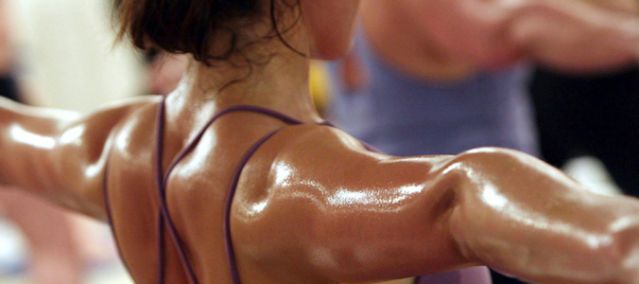Health
One Thousand Reasons Breaking a Sweat Is the Best Medicine
A new study has identified over 1,000 molecular reactions to exercise.
Posted October 2, 2015

Would you rather take a pill that mimics the health benefits of exercise or break a sweat? In a groundbreaking new study, researchers identified over one thousand molecular reactions caused by exercise. These findings open the door for the creation of pharmaceuticals that could imitate the health benefits of physical activity.
The October 2015 study, “Global Phosphoproteomic Analysis of Human Skeletal Muscle Reveals a Network of Exercise-Regulated Kinases and AMPK Substrates," was conducted at the University of Sydney's Charles Perkins Centre in collaboration with researchers from the University of Copenhagen and published in Cell Metabolism.
The researchers were able to identify over a thousand molecular changes that occur in our muscles when we exercise. These findings provide the world’s first comprehensive “exercise blueprint.” Until now, most of the research on the health benefits of exercise focused on just a small number of molecular changes. The majority of the exercise-related molecular changes identified in this study have not been previously associated with exercise.
Exercise Is a Potent Health Elixir
I’ve dedicated my adult life to identifying ways to motivate people from all walks of life to exercise regularly. The foundation of The Athlete’s Way: Sweat and the Biology of Bliss is based on the classic Greek philosophy of Mens Sana in Corpe Sano (A Sound Mind in a Sound Body). Over the years, I’ve written extensively on the neurobiology of why exercise makes us feel good and can help everybody optimize his or her physical, psychological, and cognitive well-being throughout a lifespan.
Unfortunately, physical exercise is not an option for millions of senior citizens and people with disabilities. The researchers are excited that their findings could lead to new drugs to treat people who are unable to be physically active. In a press release, David James from the University of Sydney, and the head of the research group that undertook the study, said:
Exercise is the most powerful therapy for many human diseases, including type 2 diabetes, cardiovascular disease and neurological disorders. However, for many people, exercise isn't a viable treatment option. This means it is essential we find ways of developing drugs that mimic the benefits of exercise.
For this study, the international team of researchers analyzed human skeletal muscle biopsies from four untrained, healthy males following 10 minutes of high-intensity exercise. They used a state-of-the-art technique known as mass spectrometry to study a process called protein phosphorylation.
Their analysis revealed 1,004 unique exercise-regulated phosphosites on 562 proteins. This data reveals exciting, and previously unexplored complexities, of acute exercise signaling and provides insights into the role of AMPK in mitochondrial biochemistry.
In a press release, co-author Dr. Nolan Hoffman summed up the study saying:
Exercise produces an extremely complex, cascading set of responses within human muscle. It plays an essential role in controlling energy metabolism and insulin sensitivity. While scientists have long suspected that exercise causes a complicated series of changes to human muscle, this is the first time we have been able to map exactly what happens. This is a major breakthrough, as it allows scientists to use this information to design a drug that mimics the true beneficial changes caused by exercise.
Could an "Exercise Pill" Be Developed in the Near Future?
A review of efforts to create pharmaceuticals that mimic the benefits of physical activity, "Exercise Pills: At the Starting Line," appears in the October 2015 journal Trends in Pharmacological Sciences. The analysis concludes that it is unlikely that safe and effective "exercise pills" will be developed in the near future.
In a press release, co-author Ismail Laher, of the Department of Pharmacology and Therapeutics at the University of British Columbia in Vancouver stated,
We have recognized the need for exercise pills for some time, and this is an achievable goal based on our improved understanding of the molecular targets of physical exercise. Clearly people derive many other rewarding experiences from exercise—such as increased cognitive function, bone strength, and improved cardiovascular function. It is unrealistic to expect that exercise pills will fully be able to substitute for physical exercise—at least not in the immediate future.
We are at the early stages of this exciting new field. Further development of exercise pills that act in combination may be more effective than single compounds. We just don't know anything about their long-term use in humans yet.
Conclusion: Daily Exercise Is the Most Beneficial Lifestyle Choice You Can Make

Hopefully, these studies will motivate you to kick-start an exercise regimen based on the benefits of over 1,000 molecular changes created through physical activity. Exercise has the power to keep you healthy, happy, and add years to your life. If you are able to exercise but are currently inactive or sedentary, why not be physically active today?
Although the new study from the University of Sydney could lead to the development of drugs that mimic the benefits of exercise, these pharmaceuticals are years away and could prove to be costly, as well as have unintended side effects. Why take a drug that imitates the benefits of exercise when the real thing is available right here, right now for most of us?
If you are able to exercise, remember that a little bit of physical activity goes a long way. I've written extensively on ways to motivate people of all levels of fitness to seek physical activity on a regular basis. If you'd lke to read more on this topic and why "Sweat = Bliss," check out my Psychology Today blog posts,
- "The Neurochemicals of Happiness"
- "One Simple Way to Improve Your Brain Function"
- "Very Small Amounts of Exercise Can Reap Huge Benefits"
- "Breaking a Sweat Could Save Your Life"
- "Irisin: The "Exercise Hormone" Has Positive Health Benefits"
- "The "Exercise Hormone" Irisin Is NOT a Myth"
- "Subliminal Cues Impact Motivation, Endurance, and Longevity"
- "5 Ways to Protect Yourself From the Leading Cause of Death"
- "The Neuroscience of Perseverance"
- "Superfluidity: Peak Performance Beyond a State of "Flow""
- "Physical Activity Improves Cognitive Function"
- "Why Does Physical Activity Improve Cognitive Flexibility?"
- "Moving Your Body Is Good For Your Mind"
- "The Neuroscience of Imagination"
- "Can Exercise Protect Your Brain From Depression?"
- "25 Studies Confirm: Exercise Prevents Depression"
- "Hippocrates Was Right: Walking Is the Best Medicine"
© 2015 Christopher Bergland. All rights reserved.
Follow me on Twitter @ckbergland for updates on The Athlete’s Way blog posts.
The Athlete’s Way ® is a registered trademark of Christopher Bergland.




